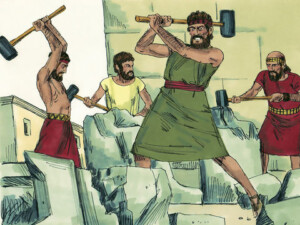Helping Like a Levite
 Families helping families.
Families helping families.
Sometimes it happens, and sometimes it doesn’t. I came across an interesting reading about family helping family in the Old Testament the other week. While it’s true that there was so much disagreement among the Tribes of Israel that they ended up parting ways into two different nations, there’s a lot we can learn from them. This story is one example.
I know I’ve read this story more than a dozen times, but this time I read it in a different translation, and I picked up on what a family does. There was a need, and that’s when the helpers in the family stepped up.
Background
The Levites descended from Levi, the son of Jacob (Israel). They were chosen by God to serve as priests. There were different rules for the Levites. They were not allowed to own land, but instead, they were given land by the other tribes. Their responsibility was the care of the Tabernacle – setting it up, tearing it down, and transporting it. They were also responsible for transporting the Ark of the Covenant in Israel’s wilderness travels. The Levites didn’t choose their responsibility; God gave it to them.
When it came time for worship and animal sacrifices, the Levites were designated to be in charge. There were dress codes, behavior codes, and ritual codes – also designated by God. It’s true that some Levites (such as Samuel’s sons) did not follow God’s order. You can read about that here. They were just as human and prone to disobedience and evil as we are.
Yet, the faithful Levites served in the temple and led in worship as God planned their role to do. Not all of the Levites were priests, but the entire tribe of Levi was set apart to care for the tabernacle and to lead the people in worshipping God.
Returning to God
 When King Hezekiah instituted a return to God, the people helped break down altars and tear down places of idol worship. Hezekiah called the people together for repentance and a renewed practice of worshipping Jehovah God as He required. The Levites went into the Temple to purify it – which included removing unclean things. When the purification was completed, they were now ready for worship.
When King Hezekiah instituted a return to God, the people helped break down altars and tear down places of idol worship. Hezekiah called the people together for repentance and a renewed practice of worshipping Jehovah God as He required. The Levites went into the Temple to purify it – which included removing unclean things. When the purification was completed, they were now ready for worship.
Bulls, rams, male goats, calves, lambs, and kid goats were brought to the temple. The priests (descendants of Aaron) offered the animals on the altar. After the sacrifices were completed, King Hezekiah told the people of Judah to bring sacrifices and offerings to show thanks to God. The people came with their sacrifices and offerings: 70 bulls, 20 rams, 200 lambs. The holy offerings totaled 600 bulls and 3,000 sheep and goats. That’s a lot of animals to slaughter!
 The people gathered to praise God. The priests led in worship, and everybody recognized the goodness and forgiveness of God. They wanted to praise and worship as they used to do.
The people gathered to praise God. The priests led in worship, and everybody recognized the goodness and forgiveness of God. They wanted to praise and worship as they used to do.
Helping hands needed
II Chronicles tells us there were not enough priests to skin all the animals for the burnt offering. So their extended tribe, the Levites. helped them until the work was finished and additional priests could be made chosen and sanctified.
People were ready to return to God and renew their practice of worshipping Him as they had been commanded. There was such an influx of animals brought to be sacrificed that the priests could not keep up. Because the priests were overwhelmed with the work, “their relatives, the Levites, helped them until the work was finished.”
I’ve thought about that one sentence all week long. The Levites knew what to do, and they stepped up to the plate and helped. Because they were present, they saw the need. They did something about it. That’s what families should do. When we are present, we can see needs, and then we know what we should do. We can help until all the work is done. That’s what families should do.
Choosing to be a part of family – or not
Not all of us have families like that. Not all of us are willing to participate and to be present so we can see the needs. No matter what your family is like, you can take a lesson from this example. This story is a powerful showcase of what a family can – and should – do when the chips are down. We can choose to be absent from worship, or we can be present and available. We can choose to participate and be present so that, when there’s a need, we can step up and help until all the work is done – ’cause that’s what healthy families do.
There isn’t a family around without discord of some sort, at some time or another. Some discords last for years; others last for a lifetime. Some discords resolve quickly. No matter how long the discord has been there, the temptation is to withdraw from others. Who wants to hang out with folks who are rude to you or who show their disdain for who you are?! Not a single one of us. Who wants to claim folks who speak negatively of you or ignore your presence in public? Why would anyone want to be a part of the discord when removing himself will lessen stress?! It’s the easiest – and most natural – thing to do.
This story shows us that when we’re in the mindset of worshipping God, we will be in the mindset of helping others – including family. The Levite family was in the mindset of getting right with God. They helped clean the temple, then prepared to do what was necessary to enhance the worship of the entire group of people – the Israelites.
The people responded by bringing thousands of animals for sacrifice. There was a need – and the Levite family, gathered together because of worship, stepped up to the plate and fulfilled the need. They stayed together – and worked together – until all the work was done. What a beautiful picture of what a family can do.

Attribution for the photos depicting the story of Hezekiah goes to Sweet Publishing through freeBibleimages.org





